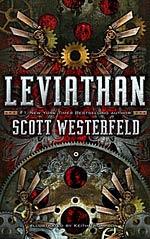
![]() verkisto
verkisto
7/26/2016
![]()
When I was in school, history was my most-dreaded subject. Now, I've found that there are a lot of fascinating facts to find in history, it's just a matter of finding a way to get the information in a way that appeals to me. I think that historical fiction is one way to catch up on the history I missed, even though in cases like Leviathan, it's a little ... well, different from the way history actually told it.
In this book, the start of another trilogy by the author who brought us the Uglies series, we see the development of World War I, through the eyes of the Clankers and the Darwinists. In this history, there are two different approaches to technology: One creates mechanical beasties that can be used as weapons of warfare; the other mixes DNA from different creatures to fabricate living, breathing pieces of warfare that draw on different animals in nature. It's definitely a steampunk novel, where it's set in the past, yet populated with modern technologies, but it's an appealing, interesting background against which to see a different outlook on history. Plus, making the main character one of the key players in the outbreak, even when he isn't representative of any historical figure, makes the drama and intrigue come to life a lot more than reading something out of a history book. Of course, I don't think novels like this one will ever replace nonfiction, but it's nice to see a novel that draws enough on reality -- and acknowledges it in the afterword -- that it will encourage readers to learn more about the subject on their own.
The story itself was gripping, since it flip-flopped between two characters, one from the Darwinists' side (England), and one from the Clankers' side (Austria). It's sort of a cheap tactic to build suspense by going back and forth between characters, leaving them at critical points to ensure that the reader will keep reading to see what happened, but I can't deny that it works. It was also a little more readable than the Uglies series, for a reason I can't identify. Maybe it was the setting, or the backdrop, or the lack of necessity in creating a new slang to identify the characters' cultures. Deryn, the main Darwinist character, has some slang so that she can swear without actually swearing in the book (like saying "Blisters!" instead of something that the publishers may not approve of), but other than that, the narrative flowed naturally, and never pulled me out of the story. I adore the premise behind Uglies, but this novel had a better flow.
I was a little disappointed that this book turned out to be the start of a trilogy, but I'm looking forward to reading the rest of the series. I just hope I don't forget too many of the details from one book to the next.